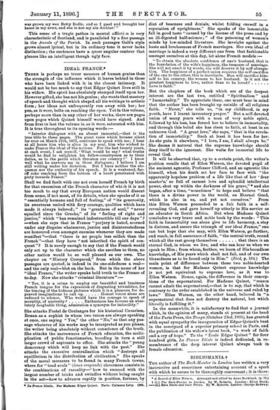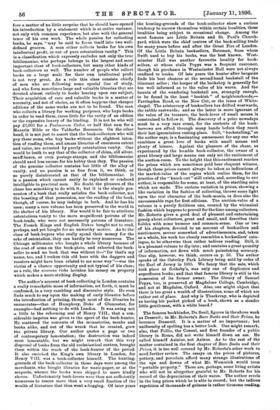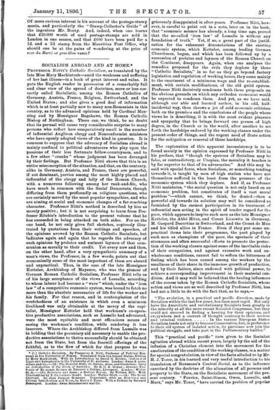BIBLIOMANIA.t
THE author of The Book-Hunter in London has written a very instructive and sometimes entertaining account of a sport with which he seems to be thoroughly conversant ; it is there- • .4 Record of Ellen Watson. Arranged and edited by Anna Buckland. (p. 72.) t (1.) The Book-Hunter in London. By W. Roberts. London : Elliot Stook. —(2.1 Rare Books and their Prices. By W. Roberta. London: George &away. fore a matter of no little surprise that he should have opened his introduction by a statement which is at entire variance, not only with common experience, but also with the general tenor of his own work. The whole passion for collecting books, he says, "may be said to focus itself into two well. defined grooves. A man either collects books for his own intellectual profit, or out of pure ostentatious vanity." This is a classification which expressly excludes not only the true bibliomaniac, who perhaps belongs to the largest and most important class of book-collectors, but many other kinds of book-collectors as well. The number of people who collect books on a large scale for their own intellectual profit is not very great. As a rule this class consists chiefly of men who are following some special line of study, and who form sometimes large and valuable libraries that are devoted almost entirely to books bearing upon one subject. Their acquisition of rare and valuable books is a matter of necessity, and not of choice, as it often happens that cheaper editions of the same works are not to be found. The man who collects a library for working purposes, who buys books in order to read them, cares little for the rarity of an edition or the expensive luxury of its binding. It is not he who will pay £5,000 for a Psalmorum Codex, or half that sum for a Mazarin Bible or the Valdarfer Boccaccio. On the other hand, it is not just to assert that the book-collectors who will pay these sums, who buy books without the slightest inten- tion of reading them, and amass libraries of enormous extent and value, are actuated by purely ostentatious vanity. One would be loath to say that of the collector of china, old silver, snuff-boxes, or even postage-stamps, and the bibliomaniac should need less excuse for his hobby than they. The passion of the genuine collector contains but little of the alloy of vanity, and no passion is so free from it, we think, or so purely disinterested as that of the bibliomaniac. It is a passion which cannot easily be explained or rendered intelligible to practical men. No doubt the pleasure of the chase has something to do with it; but it is the simple pos- session of a book that really satisfies the book-collector, not the boasting of that possession, nor the reading of the book, though, of course, he may indulge in both. And he has his uses ; many a rare volume has been preserved to the world in the shelter of his library. Nor would it be fair to attribute ostentatious vanity to the more magnificent patrons of the book-trade, who were not necessarily patrons of literature. The French Kings and English Dukes bought not to read, perhaps, and yet bought for no unworthy motive. As to the class of book-buyers who really spend their money for the sake of ostentation, they can hardly be very numerous. The Chicago millionaire who bought a whole library because of the coat of arms on the book-plate, and exhorted the book- seller to send no book that was without it—" for that's my -name, too, and I reckon this old hose with the daggers and -roosters might have been related to me some way "—was the victim of a chance opportunity and not typical of his class; as a rule, the nouveau riche lavishes his money on property which makes a more striking display.
The author's account of book-collecting in London contains a really remarkable mass of information, set forth, it must be -confessed, in a very rambling and discursive style. He even finds much to say upon the making of early libraries before the introduction of printing, though most of the libraries he enumerates—that of Humphrey, Duke of Gloucester, for example—had nothing to do with London. It was owing not -a little to the reforming zeal of Henry VIII., that a con- siderable impetus was given to the sport of the book-hunter. He scattered the contents of the monasteries, monks and books alike, and out of the wreck that he created, grew the private library. Our author quotes a page or two of contemporary lamentation; the destruction was indeed most lamentable, but we might remark that this very dispersal of books from the old ecclesiastical centres, brought them within the reach of the book-hunter of the period. It also enriched the King's own library in London, for Henry VIII. was a book-collector himself. The hunting- grounds of the book-collector in those days were among the merchants, who bought libraries for waste-paper, or at the seaports, whence the books were shipped to more kindly shores. Unfortunately book-lovers were then not sufficiently numerous to rescue more than a very small fraction of the wealth of literature that thus went a-begging. Of later years the hunting-grounds of the book-collector show a curious tendency to narrow themselves within certain localities, those localities being subject to occasional change. Among the most famous are Little Britain and St. Paul's Church- yard, which were the chief centres of the book-selling trade for many years before and after the Great Fire of London. Of the Little Britain booksellers, Bateman, from whom Swift used to buy his books, was the best known. West- minster Hall was another favourite locality for book- sellers, at whose stalls Pepys was a frequent customer, though his purchases in Westminster Hall were not always confined to books. Of late years the hunter after bargains finds his best chances at the second-hand bookstall of the itinerant seller ; the keeper of the bookshop is generally far too well informed as to the value of his wares. And the haunts of the wandering bookstall are, strangely enough, to be found in the least " bookish" of neighbourhoods,— Fa.rringdon Road, or the New Cat, or the lanes of White- chapel. The aristocracy of booksellers has drifted westwards, the rabble eastwards; and as the latter is more ignorant of the value of its treasure, the book-lover of small means is constrained to follow it. The discovery of a prize nowadays must be a very rare event, for the contents of the book- barrows are sifted through many hands before they reach their last ignominious resting-place. Still, " bookstalling," as the author says, is a fascinating amusement for any one who combines a great love of books with small means and plenty of leisure. Against the pleasure of the chase, as experienced by the humble book-collector, the owner of a great library and large means can only set the excitement of the auction-room. To the height that this excitement reaches the prices which are sometimes paid bear eloquent witness, though those prices cannot always be taken as indications of the market-value of the copies which realise them, for the practice of the " knock-out" still exists, and, according to our author, is responsible for some, at least, of the startling sales which are made. The curious variation in prices, showing a like variation in the fashion of collecting, throws some light upon the real character of the book-mania, as does also the unreasonable rage for first editions. The auction-value of a volume is a purely fictitious one, created by the whimsical fashion which happens to prevail for the time among collectors. Mr. Roberts gives a good deal of pleasant and entertaining gossip about collectors, great and small, and describes their foibles with some humour and common-sense. One or two of his chapters, devoted to an account of booksellers and auctioneers, savour somewhat of advertisements, and, taken as a whole, his work too closely resembles a booksellers' cata- logue, to be otherwise than rather tedious reading. Still, it is a pleasant volume to dip into ; and contains a great quantity of information, set down with much painstaking accuracy. One slip, however, we think, occurs on p. 56. The author speaks of the Osterley Park Library being sold by order of the Earl of Jersey in 1885. We fancy that the sale, which took place at Sotheby's, was only one of duplicates and superfluous books; and that that famous library is still in the possession of its former owner. The library of Samuel Pepys, too, is preserved at Magdalene College, Cambridge, and not at Magdalen, Oxford. Also, one might object that there is too great a wealth of illustrations, some of which are rather out of place. And why is Thackeray, who is depicted as having his pocket picked of a book, shown as a slender little gentleman, with a white beard P
The famous bookbinder, Du Senn, figures in the above work as Desseuil; in Mr. Roberts's Bare Books and their Prices, he becomes Dussenil. It is a matter of no importance; but uniformity of spelling has a better look. One might remark, also, that Pollio, the Consul, and first founder of a public library in Rome, did not write himself down an ass. He called himself Asinias, not Asinus. As to the rest of the matter contained in the first chapter of Bare Books and their Prices, it is too well covered by Mr. Roberts's other work to need further review. The essays on the prices of pictures, pottery, and porcelain afford many strange illustrations of the ups and downs of what Mr. Wemmick would term "portable property." There are, perhaps, some living artists who will not be altogether grateful to Mr. Roberts for his record of the depreciation of their wares. The author revels in the long prices which he is able to record; but the tedious repetition of thousands of guineas is rather tiresome reading.
Of more curious interest is his account of the postage-stamp mania, and particularly the " Stamp-Collector's Guide " of the ingenious Mr. Booty. And, indeed, when one learns that 220,000 worth of used postage-stamps are sold in London in one season, and that 2680 have been paid for a ld. and a 2d. stamp from the Mauritius Poet Office, why should one be at the pains of wondering at the price of rose du Barri or gros bleu vases ?




































 Previous page
Previous page